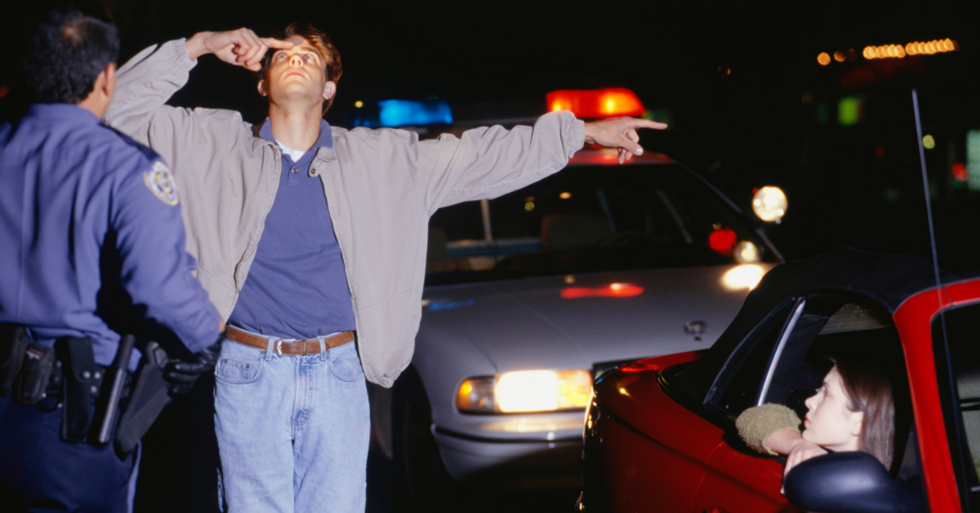Field sobriety tests are roadside tests administered when a police officer suspects a driver could be operating under the influence. If an officer requires a person to take the sobriety test, more likely than not, the officer has already determined they will be arrested for an OUI/DUI/DWI.

The field sobriety tests are often used by police to gather more information and evidence to support the arrest. The three tests that are standardized and have been studied by the federal government for trials. The tests are “Nine Step Walk and Turn,” “One Leg Stand” and “Horizontal Gaze Nystagmus.”
How Accurate Are Field Sobriety Tests?
Studies have shown that field sobriety tests have minimal accuracy. The “Nine Step Walk and Turn” was seen to be 68% reliable, the “One Leg Stand” 65%, and the “Horizontal Gaze Nystagmus” 71%. These are not high numbers to determine if someone's blood alcohol content is above the legal limit.
Many cases have won by arguing the reliability of the tests. Specific circumstances make performance difficult like weather or the driver's physical conditions. Showing that the test was administered incorrectly or given under unfair conditions helps fight a DUI.
Can You Refuse A Field Sobriety Test?
In the state of Massachusetts, drivers are under no legal obligation to take these tests and can refuse them without any consequences. A refusal to take the field sobriety test cannot be used against you as evidence at the trial for an OUI/DUI.
Even if you are under the legal limit, these tests may be incriminating and inaccurate in certain circumstances. In most cases, refusing the tests is in your best interest because they are not flawless and improper administration of them can significantly affect the outcome of the tests. Injuries, inner ear problems, obesity, specific medical conditions, and wearing certain shoes can impact the outcome of the test as well.
What Happens If You Refuse A Field Sobriety Test?
In Massachusetts, a driver has the right to politely refuse to take a field sobriety test by telling them that they do not consent to take the test. Unlike refusing a breathalyzer test, there are no license consequences for refusing the field sobriety tests. Moreover, the fact that you refuse field sobriety tests generally cannot be used against you at trial.
If a driver is asked to perform a field sobriety test and they refuse, an officer may still arrest them for a DUI if they have sufficient evidence to do so. If they also refuse the breathalyzer at the station, they risk license suspension which can be for months or even years.
How Field Sobriety Tests Work
Field sobriety tests are “roadside assessments” that generally measure motor skills, ability to operate a vehicle, follow directions, and do more than one thing at once. They are physical tests to help the police officer offer more evidence for a DUI case. It may be smart to refuse the test, especially since there are no underlying consequences, and it cannot be used against you at trial. But refusing a breathalyzer or blood test does come with consequences.
Why Do A Field Sobriety Test Instead Of A Breathalyzer?
Police officers often begin with the field sobriety tests when they pull over a driver, they suspect is operating a vehicle under the influence. After the sobriety tests are administered, the officer may ask the driver if they wish to submit to a roadside breath test. The result of this roadside breath test cannot be used at trial.
If the driver is ultimately placed under arrest and brought to the station the officer will ask if they wish to submit to a chemical breath test. This test at the police station can be used at trial. It is often in the driver's best interest to refuse this test; however, this is case dependent and should be discussed with an OUI defense attorney.
What should you do if you have questions about the administration of field sobriety tests in your case?
If you find yourself questioning the proper administration of field sobriety tests in your case and want to understand the potential defenses and challenges to the fairness and accuracy of the test results, my team and I here to offer assistance. Simply reach out to me 978-612-6447 and we can discuss your specific situation. I am more than happy to address any inquiries you may have regarding an OUI (Operating Under the Influence) charge in Massachusetts and the validity of field sobriety tests.
How can field sobriety tests be challenged in court?
Field sobriety tests can be challenged in court through various methods. One approach is to question the officer's conclusions that you failed the tests by highlighting factors that may have affected your performance. These factors could include your physical conditions such as weight, age, or medical conditions, which may make it difficult for you to perform well regardless of your sobriety. Additionally, the weather conditions during the test or any unfair administration or scoring of the tests can be used to argue against their accuracy.
Another way to challenge field sobriety tests is by questioning their reliability. Statistical evidence can be presented to demonstrate that these tests may not be consistently accurate in determining intoxication levels. By raising doubts about the reliability of these tests, it becomes possible to cast uncertainty on their ability to accurately assess whether someone is under the influence.
In court, it is also essential to employ additional tactics to add further doubt regarding the trustworthiness of these tests. This can be achieved by highlighting any inconsistencies or inconsistencies in how the tests were conducted or any potential biases on the side of the road. By utilizing these strategies, previous cases have been successfully won by arguing against the reliability of field sobriety tests.
How To Challenge A Field Sobriety Test
An experienced OUI defense attorney can challenge a driver's alleged performance on field sobriety tests in a variety of ways. For example if a police officer alleges that a driver could not walk a straight line, an attorney may be able to argue that there was no designated straight line for the driver to walk on. If the police officer alleges the driver is unable to complete the “One Leg Stand” an experienced OUI defense attorney may be able to proffer the driver's medical records which could show a medical reason the driver may have issues with balance.
Hiring an experienced OUI/DUI lawyer who knows the information about field sobriety tests and why they are often misleading evidence or what to consider when challenging the result of the tests is a wise decision.


